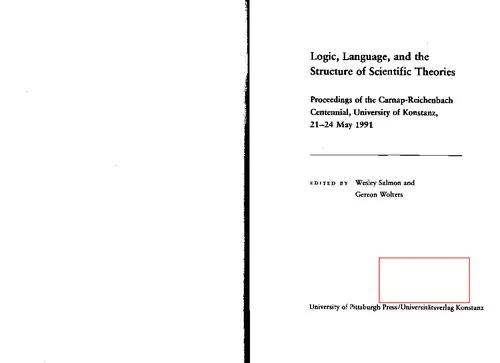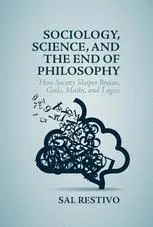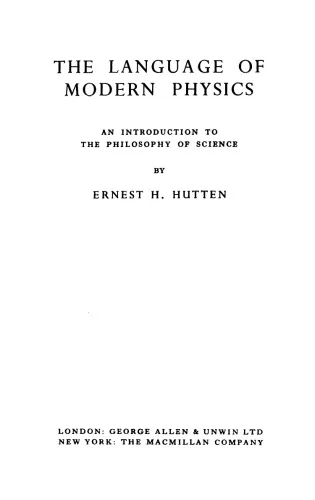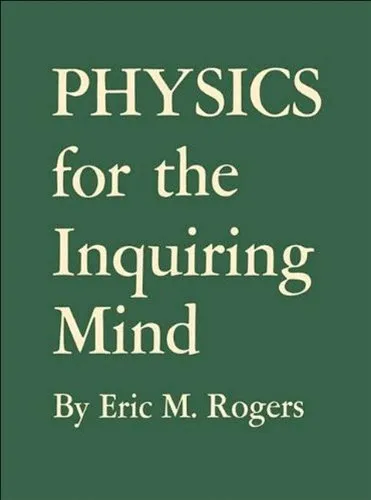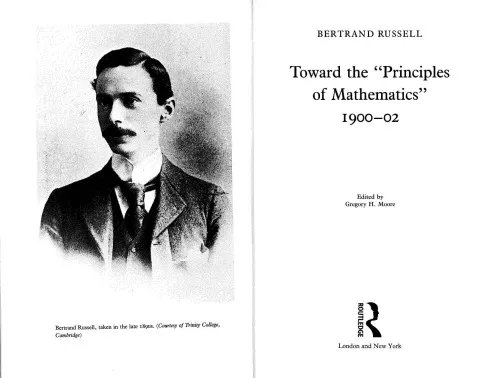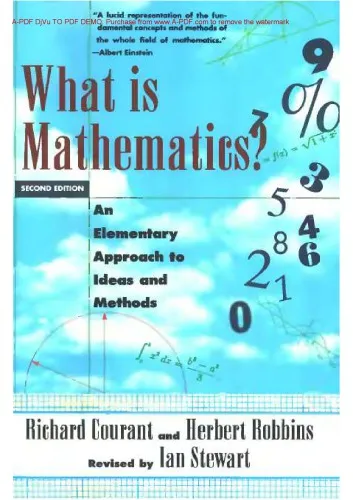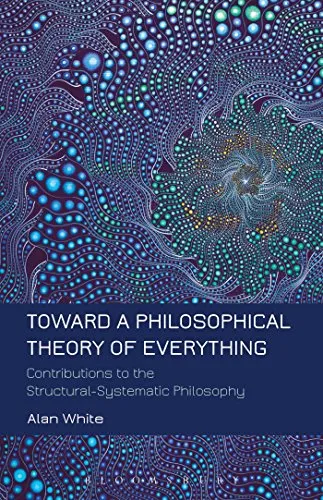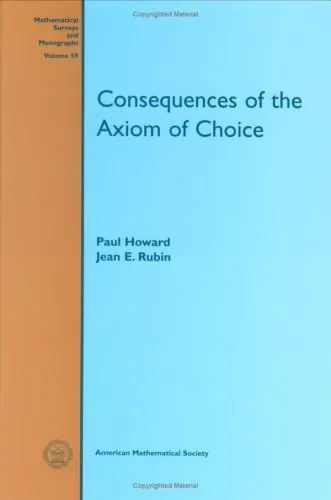Logic, Language, and the Structure of Scientific Theories (Pittsburgh-Konstanz series in the philosophy & history of science)
4.4
بر اساس نظر کاربران

شما میتونید سوالاتتون در باره کتاب رو از هوش مصنوعیش بعد از ورود بپرسید
هر دانلود یا پرسش از هوش مصنوعی 2 امتیاز لازم دارد، برای بدست آوردن امتیاز رایگان، به صفحه ی راهنمای امتیازات سر بزنید و یک سری کار ارزشمند انجام بدینکتاب های مرتبط:
معرفی کتاب
منطق، زبان و ساختار نظریههای علمی اثری برجسته از مجموعه سریهای Pittsburgh-Konstanz در فلسفه و تاریخ علم است که توسط ویراستارانی همچون Wesley C. Salmon و Gereon Wolters گردآوری شده است. این کتاب به بررسی چگونگی تعامل منطق و زبان با ساختار نظریههای علمی میپردازد و با اشاره به نظریات مختلف، به مطالعه راههایی میپردازد که دانشمندان و فیلسوفان به کمک آنها مفهومسازی علمی را توسعه دادهاند.
خلاصهای از کتاب
این کتاب مجموعهای از مقالات است که به بررسی نقش حیاتی منطق و زبان در شکلدهی به ساختار نظریههای علمی میپردازد. نویسندگان متنوع این مجموعه، از دیدگاههای متعددی به مسائل فلسفه علم میپردازند و به تحلیل عمیق از روشهای مختلف توضیح و پیشبینی در علم معاصر میپردازند. یکی از موضوعات اصلی مورد بررسی در این کتاب، چگونگی استفاده از منطق و زبان به عنوان ابزارهایی برای انتقال و تفسیر نظریات علمی است.
نکات کلیدی
- بررسی چگونگی تأثیر منطق بر ساختار نظریههای علمی و فرایندهای استدلالی.
- تحلیل نقش زبان در انتقال مفاهیم علمی و تأثیر آن بر قابل فهم بودن نظریات.
- مطالعه مقایسهای نظریههای مختلف علمی و روشهای مختلف پیشبینی و توضیح آنها.
جملات معروف از کتاب
"دانش بدون ساختار، قابل اعتنا نیست؛ این منطق و زبان است که ساختار را به علم میآورند."
"فلسفه علم پلی است که دانش قدیم را به اکتشافات نو پیوند میدهد."
چرا این کتاب اهمیت دارد
اهمیت این کتاب در تأثیری است که بر فهم ما از چگونگی تولید دانش علمی دارد. با بررسی دقیق نقش منطق و زبان در نظریههای علمی، این کتاب به دانشجویان و پژوهشگران کمک میکند تا دیدگاه جدیدی نسبت به فرایندهای علمی پیدا کنند. این اثر برای کسانی که به دنبال درک عمیقتر از فلسفه علم هستند، منبعی ارزشمند به شمار میآید. همچنین، امکان بررسی تاریخچه و توسعه نظریههای علمی در زمینههای مختلف را فراهم میسازد و به عنوان مرجع مهمی در مطالعات فلسفی علم تلقی میشود.
Welcome to a comprehensive exploration of the book "Logic, Language, and the Structure of Scientific Theories," a significant contribution to the Pittsburgh-Konstanz series in the philosophy & history of science. Edited by esteemed scholars Wesley C. Salmon and Gereon Wolters, this book delves deep into the intricate relationship between logic, language, and the foundational structure underlying scientific theories. It stands as a vital resource for anyone interested in understanding the complex mechanisms that drive scientific inquiry and theoretical development.
Detailed Summary of the Book
The book "Logic, Language, and the Structure of Scientific Theories" is a pivotal collection of essays and studies that aim to unravel the philosophical underpinnings of scientific thought and practice. The contributors to this volume have meticulously examined how language and logic serve as fundamental tools in the formation and evolution of scientific theories. They explore the semantics and syntactic structures of scientific languages, scrutinizing how these linguistic frameworks influence theoretical constructs and scientific discourse.
At its core, the book emphasizes the interplay between empirical observations and logical reasoning in the construction of scientific knowledge. It delves into topics such as the role of models and simulations, the semantics of scientific language, and the function of deductive and inductive reasoning in scientific methodology. The essays collectively contribute to a nuanced understanding of how scientific theories are both constructed and deconstructed within philosophical and logical contexts.
Key Takeaways
- Interdisciplinary Approach: The book highlights the necessity of integrating perspectives from logic, linguistics, and philosophy to gain a comprehensive understanding of scientific theories.
- Language as a Tool: It elucidates the crucial role language plays in shaping and communicating scientific ideas and the inherent challenges that arise due to language ambiguity and evolving semantics.
- Logical Frameworks: The discussion on logical structures examines how they can both aid and constrain scientific inquiry, highlighting the balance required in scientific modeling.
- Historical Context: By examining the historical development of scientific theories, the book sheds light on the dynamic nature of scientific progress and theory change.
Famous Quotes from the Book
"The essence of scientific inquiry lies not just in what we observe, but in how we interpret those observations through the conceptual schemes and logical frameworks available to us."
"Language is not merely a vessel for scientific thought, but an active agent that shapes the very structure and trajectory of our theories."
Why This Book Matters
This book is significant for several reasons. It provides a platform where multiple disciplines intersect to offer a holistic view of scientific reasoning and theory formulation. The philosophical insights presented by the expert contributors challenge readers to reconsider the foundational elements of scientific practice. As a part of the Pittsburgh-Konstanz series, it holds a special place in advancing discourse on the philosophy and history of science, making it an essential read for scholars, scientists, and anyone interested in the philosophical dynamics of scientific theory.
دانلود رایگان مستقیم
شما میتونید سوالاتتون در باره کتاب رو از هوش مصنوعیش بعد از ورود بپرسید
دسترسی به کتابها از طریق پلتفرمهای قانونی و کتابخانههای عمومی نه تنها از حقوق نویسندگان و ناشران حمایت میکند، بلکه به پایداری فرهنگ کتابخوانی نیز کمک میرساند. پیش از دانلود، لحظهای به بررسی این گزینهها فکر کنید.
این کتاب رو در پلتفرم های دیگه ببینید
WorldCat به شما کمک میکنه تا کتاب ها رو در کتابخانه های سراسر دنیا پیدا کنید
امتیازها، نظرات تخصصی و صحبت ها درباره کتاب را در Goodreads ببینید
کتابهای کمیاب یا دست دوم را در AbeBooks پیدا کنید و بخرید
1398
بازدید4.4
امتیاز0
نظر98%
رضایتنظرات:
4.4
بر اساس 0 نظر کاربران
Questions & Answers
Ask questions about this book or help others by answering
No questions yet. Be the first to ask!
